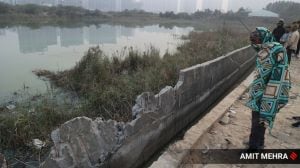Escape From Paradise
In July 1947, Dhuni Chand Mehta was transferred by the Kashmir government to Muzaffarabad as district commissioner wazir-e-wazarat. This n...

In July 1947, Dhuni Chand Mehta was transferred by the Kashmir government to Muzaffarabad as district commissioner wazir-e-wazarat. This northwestern region of Jammu and Kashmir, affected so tragically by the earthquake last month, was then on the threshold of a man-made schism. The air crackled with foreboding. Mehta8217;s wife, Krishna, upon joining him a week later, sensed it: 8220;Muzaffarabad was not unfamiliar to me, but on this occasion I somehow could not enjoy being there. I was filled with a vague fear of my surroundings, though I did not quite know why, and
felt like running away from the place. I was so depressed that I did not even unpack the luggage. 8216;We have to get away from here and go somewhere else,8217; I often told my husband. 8216;We won8217;t stay here. I shan8217;t unpack.8217;8221;
In the event, Krishna Mehta stayed on. Three months later the Pakistan military sent Pashtun tribesmen into Jammu and Kashmir. The raiders deployed aggression and rumour to stir
an already restive people into communal allegiances and to
warn of reprisal if help was offered to old neighbours.
| nbsp; | To read first-person accounts like these is to acknowledge the strength India and Pakistan drew from resilience of refugees and migrants in the early years |
Kashmir 1947 is the raw draft of Mehta8217;s ordeal. Separated from her husband 8212; who was subsequently killed by the invaders 8212; she shepherded her six children and various acquaintances from refuge to temporary shelter, moving on as her benefactors turned apprehensive about discovery. It unflinchingly documents every moment of terror, every act of betrayal, every extreme step contemplated in case she or her children were to be abducted, every act of kindness unexpectedly offered by her captors. It is an account of danger met with courage and quick-thinking.
Months later, when Mehta and her charges arrived at a camp in Kurukshetra, her story moved Jawaharlal Nehru and he claimed her as a sister. Mehta passed away in 1993, after becoming the first woman to be selected as a member of Parliament from Kashmir, and it is not made clear in this slim volume whether her account has been extensively edited or not. It comes, in any case, unbuttressed by historical background or an afterword. That is a pity. 1947 visited immense madness on the subcontinent. Almost 60 years later, to read first-person accounts like these is to acknowledge the strength India and Pakistan drew from the resilience of refugees and migrants in those early years of independence, people who demanded no certification for sim-
ply getting on with their lives.
But in this raw, urgent telling, those accounts of 1947 are unsettling. In being presented today, they need to be distanced by analysis.
- 01
- 02
- 03
- 04
- 05































